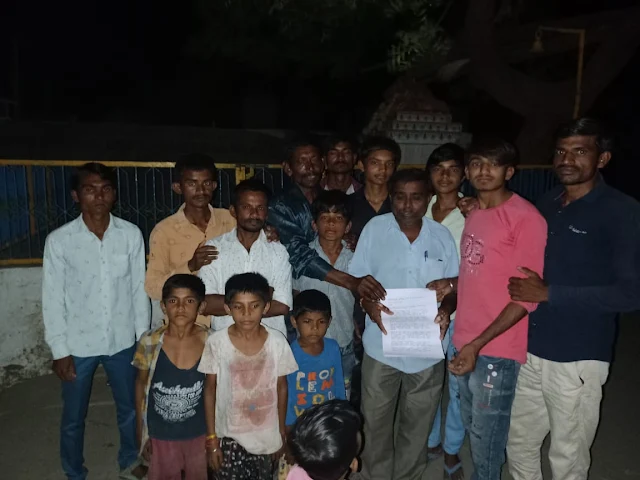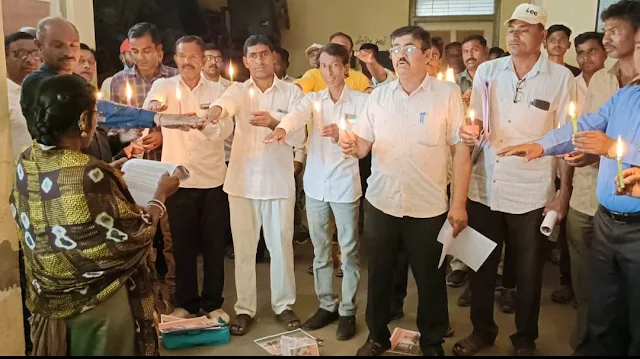By Jag Jivan
In a symbolic protest, Dalit households of as many as 1,100 villages across Gujarat switched off lights on the state’s foundation day, May 1, for 15 minutes at 9:00 pm to demand that all the political cases against not only top Dalit rights leader Jignesh Mevani, who happens to be a Gujarat MLA, but also against Dalit, Adivasi and minority individuals be withdrawn as part of general amnesty.
Originally planned to express anger against the manner of arrest of Mevani, who was taken away by Assam police with the active support of Gujarat police on the basis of an FIR filed against a tweet on Prime Minister Narendra Modi, the protest was converted into the demand to end atrocities against Dalits and other marginalised communities.
A memorandum, addressed to Gujarat chief minister Bhupendra Patel, demanded that the “political party responsible for the abusive treatment meted out to the Hon'ble MLA of Gujarat, Jigneshbhai Mevani, should apologize to the Dalit voters of Gujarat and India.”
Veteran Dalit leader Martin Macwan, the main brain behind the programme, told Counterview, “Apart from the demand to take back politically motivated cases against marginalised communities in the same way as cases were withdrawn against those allegedly involved in the 2015 Patidar agitation in Ahmedabad, we demanded, end of untouchability in the state.”
Even as taking strong exception to the “insulting” and “anti-Dalit” behaviour against Mevani, which allegedly could not have happened without the consent of the party in power, the memorandum said, it was shameful that even 22 years after Gujarat became a separate state, untouchabililty continues to exist the state’s social fabric, with those in power doing next to nothing to end caste discrimination.
Macwan, who took present during the unique protest move in Asamali village, about 65 kilometres south of Ahmedabad, said, the memorandum was submitted to the lowest level official, talati, in each of the 1,100 villages, or to the panchayat chief, to be forwarded to the chief minister. “There were cases when talatis refused to accept the memorandum, hence it was handed over to the panchayat chiefs”, he said.
Before submitting the memorandum, Dalits, who gathered in groups in each of the 1,100 villages with Dr BR Ambedkar’s photos in hands after they switched off the lights in their houses, pledging to defend the Constitution of India, which insisted on social equality and ushering in a society free of untouchability and caste discrimination.
In a symbolic protest, Dalit households of as many as 1,100 villages across Gujarat switched off lights on the state’s foundation day, May 1, for 15 minutes at 9:00 pm to demand that all the political cases against not only top Dalit rights leader Jignesh Mevani, who happens to be a Gujarat MLA, but also against Dalit, Adivasi and minority individuals be withdrawn as part of general amnesty.
Originally planned to express anger against the manner of arrest of Mevani, who was taken away by Assam police with the active support of Gujarat police on the basis of an FIR filed against a tweet on Prime Minister Narendra Modi, the protest was converted into the demand to end atrocities against Dalits and other marginalised communities.
A memorandum, addressed to Gujarat chief minister Bhupendra Patel, demanded that the “political party responsible for the abusive treatment meted out to the Hon'ble MLA of Gujarat, Jigneshbhai Mevani, should apologize to the Dalit voters of Gujarat and India.”
Veteran Dalit leader Martin Macwan, the main brain behind the programme, told Counterview, “Apart from the demand to take back politically motivated cases against marginalised communities in the same way as cases were withdrawn against those allegedly involved in the 2015 Patidar agitation in Ahmedabad, we demanded, end of untouchability in the state.”
Even as taking strong exception to the “insulting” and “anti-Dalit” behaviour against Mevani, which allegedly could not have happened without the consent of the party in power, the memorandum said, it was shameful that even 22 years after Gujarat became a separate state, untouchabililty continues to exist the state’s social fabric, with those in power doing next to nothing to end caste discrimination.
Macwan, who took present during the unique protest move in Asamali village, about 65 kilometres south of Ahmedabad, said, the memorandum was submitted to the lowest level official, talati, in each of the 1,100 villages, or to the panchayat chief, to be forwarded to the chief minister. “There were cases when talatis refused to accept the memorandum, hence it was handed over to the panchayat chiefs”, he said.
Before submitting the memorandum, Dalits, who gathered in groups in each of the 1,100 villages with Dr BR Ambedkar’s photos in hands after they switched off the lights in their houses, pledging to defend the Constitution of India, which insisted on social equality and ushering in a society free of untouchability and caste discrimination.





Comments